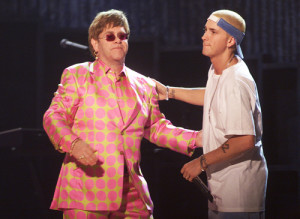By Jon Pareles
The New York Times
In the furor that surrounded this year’s Grammy contenders for album of the year, it may surprise no one to hear that one of the nominated albums included a song whose narrator gloats over his affair with an underage girl and tries to pressure her into a threesome. Or that another tune from the album was about a man propositioning his young cousin.
But those songs aren’t on Eminem’s widely denounced — and ultimately also-ran — The Marshall Mathers LP. Actually, “Janie Runaway” and “Cousin Dupree” are two of the catchier songs on the album that took top honors this past week: Steely Dan’s Two Against Nature.
Steely Dan’s songwriters, Walter Becker and Donald Fagen, have gotten a free pass from the watchdogs of content because it’s understood that they are, like most artists, professional liars, otherwise known as storytellers. Becker and Fagen, like many novelists, screenwriters and playwrights, create sleazeballs and empathize enough to make them believable.
It’s widely accepted that “Janie Runaway” doesn’t mean Steely Dan endorses statutory rape. Becker and Fagen happen to be curious about how their character would coax his “wonderwaif,” about his rationalizations and self-delusions, about the ways a conscience can warp to accept repulsive actions. They also like the perverse frisson of wrapping a creepy monologue in highbrow chord changes and luxuriously nonchalant arrangements.
No leeway for Eminem
Steely Dan’s music isn’t abrasive like hip-hop. It’s at the opposite extreme, cool and enticing. Some listeners might even find themselves singing along with deeply unsavory come-ons. The group’s audience, mostly boomer-age adults, considers itself sophisticated enough to handle a few ironies and the concept of an unreliable narrator. Becker and Fagen are punctilious pop craftsmen who have spent a long time in the music business. So Steely Dan is granted literary license.
Eminem gets no such leeway. To critics, he’s belligerent, foul-mouthed and sick-minded, and his favorite all-purpose insult is a homophobic slur. (In a defense that’s both weak and disagreeable, he has said he doesn’t mean it to apply only to homosexuals.) Where Steely Dan uses insinuation and indirection, Eminem is bluntly antagonistic; where Steely Dan lives for understatement, Eminem goes for hyperbole. And his music is hip-hop, which renders him immediately suspect to much of the baby-boom generation.
Somehow, all those factors make him forfeit the presumption that every word on his album is not completely, unironically sincere. He’d be the first artist who, to paraphrase Philip Roth, never made anything up.
Where Steely Dan plays one basic identity game — impersonating louse after louse — Mathers runs a multiple-identity Olympics. He’s a success, a loser, a madman, a star, a whiner, a combatant, a jerk — anything, he insists, but a hypocrite. He portrays realistic irritation spilling over into homicidal rampages, and as a child of the tabloids, he exploits his own troubled real-life marriage, like Henny Youngman turned bloodthirsty. He knows he’s a mess; he also jeers that plenty of other people have thoughts like his that they’re unwilling to admit.
Notoriety means sales
Unlike many of his detractors, though, Eminem regularly makes a distinction between words and action. In “The Way I Am,” for example, he explains that blurting out berserk fantasies “helps in itself to relieve all this tension dispensin’ these sentences.”
Meanwhile, his music connotes comedy: bouncy keyboard lines, whiz-crunch sound effects. Eminem leaves it to listeners to separate his Grand Guignol humor from his position statements, and, so far, the fans may be better literary analysts than the horrified adults.
Eminem knows full well that notoriety means sales. The more censure is heaped on him, the more respect he gains from disaffected teen-agers. What may have been the funniest part of the Grammy hoopla was that Eminem-haters believed the imprimatur of the Grammy would be to Eminem’s advantage, that it would have established him in the pop mainstream.
Instead, giving Eminem the award, or even letting him get near it, just might have certified him as one more piece of popcraft, a show-business act who doesn’t even scare the graybeards at the Grammys. He can thrive as a scourge and an underdog, but Grammy approval might have torpedoed his credibility in an instant.


No comments yet.